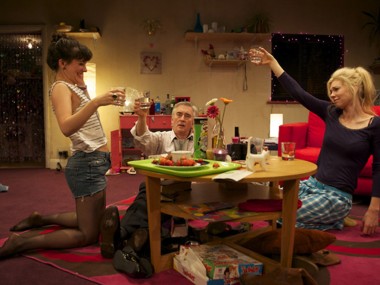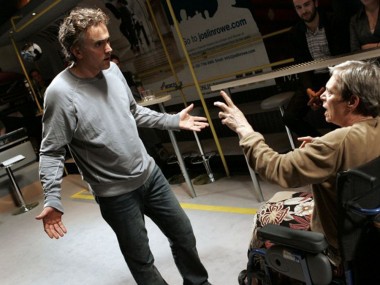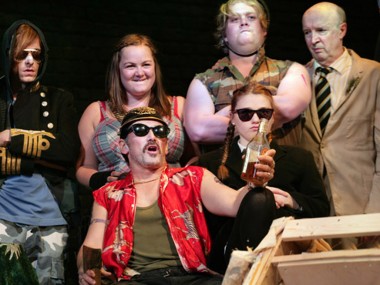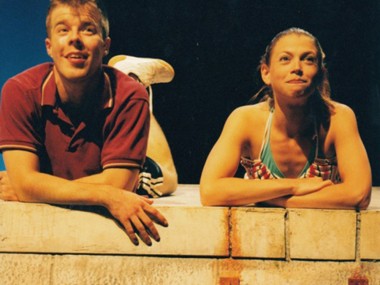Signs of Dissent (New Writing 2011)
Tuesday 1st November 2011
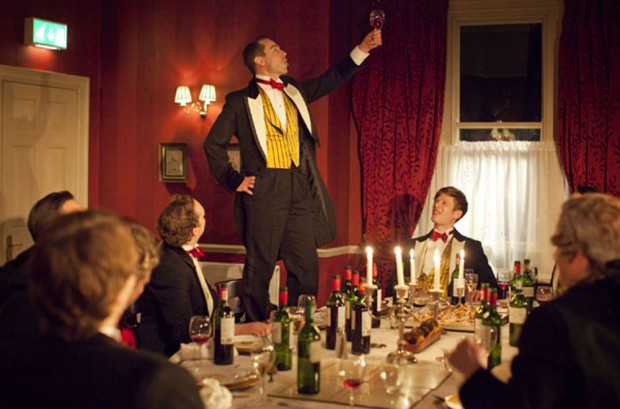
The latest addition to the London skyline is the Shard, the tallest building in Europe. When completed in May 2012, this gleaming Renzo Piano tower will stand more than 1,000 feet tall. But although this example of architecture on steroids has drawn praise, today the most striking thing about it is that it seems to be a symbol from an era whose free-market values are now being questioned. Power architecture from the past. Today, of course, this kind of construction is being regarded sceptically by people who are increasingly critical of the system that built it. At a time when signs of dissent are unmistakable, it is worth asking two questions: how is this reflected in British new writing? And using what theatrical styles? Much new writing is stuck in the past. Its default position is worship of one old god: journalistic social comment. Who cares if the play is any good? What matters is that it represents an issue and a recognisable social context in a naturalistic way. But a handful of theatre-makers are opposing this means of representation, and with increasing vigour.
Faced with the global economic crisis, which began with the credit crunch of September 2008, British theatre has been quick to report these convulsions. Along with some mini-seasons of short plays that reacted like blog posts, but were destined to be forgotten, the big players have also made their voices heard. At the National, within a year of the banking collapse, David Hare was already giving a report on the financial scene in The Power of Yes (2009). Like his account of the build-up to the War in Iraq, Stuff Happens (2004), this is a play dominated by men in suits, although his decision to put himself into the story, as the Author (played by Anthony Calf), gives a human heart to this tale of securitised credit arrangements. A series of scenes illustrate the power of money, the illusion of prosperity and the almost unbelievable fact that when the banks went bust, capitalism was replaced by a socialism that bailed out the rich. Some moments are priceless: at one point, Sir Fred Goodwin, head of the failed Royal Bank of Scotland, demands to know why he should apologise — the answer is, “Because if you don’t you will look like a total cunt” (62). Iconic images are reproduced. One is of the sacked employees of Lehman Brothers taking home their possessions in large cardboard boxes — the biggest laugh of the evening is the idea that these contained looted food from their canteen! One of the projected images is of the queues outside Northern Rock in 2007, yet the voices of such people are not invited to Hare’s party. Instead, we have a journalistic account of economic collapse from the top. Somewhere, out in the cold, stood the others. Who will tell their story?
The poverty of journalistic theatre can be seen by comparing this play to two other brilliant, ink-splashed, works of this time: Lucy Prebble’s Enron and Jez Butterworth’s Jerusalem (both 2009). Enron is an ambitious, theatrically exciting and highly resonant play that manages to describe the collapse of a Texan energy giant in 2001 in a way that makes it immediately relevant to British audiences living in the wake of the financial crisis. Similarly, the massively successful Jerusalem is both about a bunch of rural pissheads and about the addled state of the nation threatened by the unholy alliance of corporate blandness and council regulation, market greed and bureaucratic bone-headedness. On a visceral level, it blows smoke into the face of respectable society. What was truly exciting was that neither play was literal-minded: both took a skewed look at their subjects. Likewise, Dennis Kelly’s catastrophist and sprawling view of today’s corporate capitalism, The Gods Weep (Hampstead, 2010), drew more on imagination than on any political manifesto.
Everywhere you look, the indirect approach works better than journalism. In a masterly stroke of programming, Laura Wade’s perfectly titled Posh (Royal Court) ran during the general election of 6 May 2010 (opening in the previous month). But instead of directly documenting the university days of Tories such as David Cameron, George Osborne or Boris Johnson — all members of Oxford university’s exclusive Bullingdon Club — Wade created a fictional Riot Club, whose privileged elite abuse, wreck and threaten the lives of ordinary people. In the end, they kill the landlord of the pub they are trashing. Freed from the restraints of journalistic accuracy, she also shows how these youthful contacts later lead to political corruption. With its onstage ghost of an 18th century Tory, who possesses one of the young men and whose “Why suffer ye this plague of peasants” speech is both hilarious and chilling (139), the play left you with an ineradicable vision of rich toffs smashing up a claustrophobic red room: a powerful metaphor for what was about to happen to the nation. (1) With its Act One curtain line, “I am sick to fucking death of poor people” (126), this key play seemed to accurately take the temperature of the times.
Belatedly, climate change climbed up the agenda. This was another intimation of theatre’s sudden sensitivity to catastrophe. Enter Richard Bean and The Heretic (Royal Court, 2011), a play about climate change that dared to suggest that scientific consensus could be similar to religious belief. As one character says, “I’m a scientist yeah. I can’t allow myself to ‘believe in’ anything” (80). Some of the plot mechanisms, especially at the end, creaked loudly enough to disturb even his most ardent fans, but the central gesture of the play — a vigorous two-fingers up at liberal pieties — was surely welcome. It was a very funny evening, much to the discomfort of Juliet Stevenson, who never looks like the kind of actor that appreciates having to pause every second line while gales of laugher wash over the audience. But the belly-laughs were balanced by the stimulation of Bean’s transgressive ideas. Of course, some might cry foul about his particular interpretation of the Climategate email scandal, but the sheer pleasure of the play’s energy brushed aside such objections.
About Greenland (National, 2011), which was written by four playwrights — Moira Buffini, Matt Charman, Penelope Skinner and Jack Thorne — it should be said that it was not as bad as most reviewers made out, but it was not as good as the opportunity allowed. Sometimes the process of writing a play sucks the life out of it. Unused to hosting devised work, the National was unable to capitalise on the talent it recruited. Worse, director Bijan Sheibani did a Rupert Goold, with the result that this looked like a Headlong show, complete with vivid projections, flashing strobes, percussive effects, rain storms made of paper, and of water. As a collection of visual metaphors, Greenland was disappointing — a flying shopping trolley is not the most original image of consumer capitalism. The scene-stealing polar bear was beautiful but likewise over-familiar. (2) Typical of today’s political plays, there was an element of magic realism. In the icy wastes of Greenland, the meeting of two men turns out to be one man talking to his younger self (a device used wonderfully by Tom Stoppard in The Invention of Love). The final discussion crystalised the ethics of the play: “It’s about seeing the world as it is, not how you want the world to be” (94). A conclusion which is a good starting point but a poor ending.
Collaboration between playwrights increased, often with unimpressive results. Decade (2011), Rupert Goold’s Headlong epic which asked 20 playwrights to react to the anniversary of 9/11, is certainly ambitious, but it is also sprawling, terribly uneven and often tedious. While it is hard to fault its site-specific location in a former trading hall in a St Katharine’s Dock office, many of its scenes are heavy on journalism and light on metaphor. But there are some memorable moments: Mike Bartlett’s dialogue between a cynical journalist and Osama bin Laden’s killer, and Simon Schama’s reminder of the wider historical sweep, which concludes with the phrase: “You don’t measure victory by the height of the building, but by the power of your idea” (207). Tell that to the Shard. Despite all of the dancing on tabletops, Decade lacked magic. Still, another play which features a tabletop is more successful in finding a small but powerful metaphor: Steve Thompson’s Roaring Trade (Soho, 2009) has a lovely scene in which a City bond trader explained his work to his 10-year-old son by using food leftovers on a McDonald’s restaurant tabletop. A much more successful instance of collaboration was David Eldridge, Robert Holman and Simon Stephens’s A Thousand Stars Explode in the Sky (Lyric Hammersmith, 2010), a bold experiment which imagined the end of the world, surely a metaphor for our times.
Equally bold, two plays articulated the growing sense of defiance, and the new political awareness of youth, and both were by Mike Bartlett, who began to explore a much wider canvas to that of his early plays. In Earthquakes in London (Headlong, 2010) Bartlett’s writing is finely tuned and observant, witty and playful, articulate and imaginative. At more than three hours, it’s the kind of play that really shouldn’t work, but somehow does. A beguiling mix of social comedy, political discussion, family drama, sci-fi fantasy and energetic entertainment, it storms along at a cracking pace that constantly sets up contrasts and clashes so your interest never flags. One of the play’s chief delights is its kooky encounters, and its leaps of time: in one mind-bending moment, the play jumps forward in time by a decade and a half, at another it leaps into the 26th century! At one moment you are in the real world, at another inside the head of one of the characters. Directed by Rupert Goold, Earthquakes in London is full of visual treats: a government minister hides with her red box in a white loo; an environmental protester does a burlesque strip; an old woman evokes the old certainties of Britain in the 1940s; student girls party in one character’s fantasy; black-clad mums with shades and prams croon and dance; a paper plane flies across the theatre; there’s a confrontation played out by torch light.
Bartlett’s follow-up, 13 (National, 2011) is set in a UK that feels a bit like a parallel universe, with a Conservative government led by a woman Prime Minister who supports a US-led invasion of Iran designed to rid that country of nuclear weapons. While there are demonstrations in the streets, a young preacher, John, builds a peace movement. Its supporters chant: “In our name! In our name!” As a picture of contemporary society — with its references to the social network revolutions and echoes of the Arab Spring — 13 is an ambitious and amazing work. It clearly feeds off the recent student protests and urban riots, and seems to anticipate the anti-capitalist camp outside St Paul’s Cathedral in London. The central message of personal responsibility and the dangers of trusting messianic leaders is timely and extremely engaging. There are passages of urgent and powerful writing, and a theatrical expansiveness that would be momentous if only it had been perfectly carried off. Yet if the play’s flaws suggest that at some points Bartlett has written himself into a corner, and not found the twist that could free him, this is still a marvellous evening in the theatre.
New themes in theatre are pretty rare so when one does show up it seems to signal a social sea change. In 2010, three plays tackled the same subject: the conflict between the babyboomer generation, who have everything, and the new twentysomethings, who have nothing but their debts. According to social commentators, the oldies now hog the best-paying jobs, the best-value housing and the best lifestyle, while youngsters struggle with student loans, long work hours, poor pay and a hopelessly overpriced housing market. The first play to mention this was James Graham’s The Whisky Taster (Bush), the second was Mike Bartlett’s Earthquakes in London and the third was his Love Love Love. Clearly, this reflects social changes outside the theatre. Likewise, as early as July 2009, Ella Hickson spoke in her ‘Introduction’ to her published playtext, Eight (Edinburgh/Trafalgar Studios), of a dawning era when, for young people, “Apathy is no longer going to be an option. Whilst times will be hard — and I realise this may be easy to say when the worst is yet to come — I feel a little struggle may be no bad thing. For it’s only when times get really tough that you work out what really matters — and maybe, by then, we’ll be ready to believe it.” Maybe. Tentative as this is, her heart’s surely in the right place.
But the question remains: who is the Jimmy Porter of our era? Who is the voice of defiance? Asked like this, answer comes there none. One candidate, Rooster Byron of Jerusalem, is a possible figure of defiance and rebellion. But he is a traveller, a drunk, a drug taker and an outsider. He is a bad husband and a bad father. He is irresistibly attracted to under-age girls. However vivid, his revolt is the revolt of a loser. But maybe the same was true about Jimmy Porter. If an exemplary rebel for our times remains a stubbornly absent figure, there have been plenty of confrontations between idealistic and pragmatic individuals, something of a recent tradition in contemporary plays. Examples include Alexi Kaye Campbell’s The Faith Machine and Stella Feehily’s Bang Bang Bang (both Royal Court, 2011). In many new plays, there is a shrinking, a turning away from the underclass of chavs, petty crims and small-time crooks, and a renewed preoccupation with middle-class life. Will this trend continue? Well, predictions are dangerous: very soon after I completed my book on Rewriting the Nation, in which I confidently wrote that “The growth in religious feeling was of no concern to playwrights”, religious belief suddenly appeared to be of interest to several British playwrights: look, for example, at 13, The Faith Machine, and Drew Pautz’s Love the Sinner (National, 2010). Abi Morgan’s 27 (Royal Lyceum, 2011) is about a community of nuns: it opened in Edinburgh at about the same time that anti-capitalist protestors pitched tents outside St Paul’s. Yes, there is something in the air alright. And Africa remains a political litmus test: in plays by debbie tucker green, Alexi Kaye Campbell, Drew Pautz and Stella Feehily we were reminded of distant wounds, not always in a purely journalistic way. (3)
Yet despite this concern for Africa, the world represented by new writing remains a shrunken place. You can see films about Mexico, but not plays; ditto for Iran. The effects of the credit crunch in Ireland or Iceland was ignored. No one writes about what is happening in Greece. Everyone ignores the EU. I’m not arguing that playwrights should be foreign correspondents, but imitating the posture of an ostrich is surely not the most flattering position to adopt. Above all, China remains a terra incognita. The one exception to the rule that British theatre must ignore the world’s fastest growing economy is Tim Luscombe’s Hungry Ghosts (Orange Tree, 2010). Here was a solid if imperfect play about human rights and sport. The fact that it’s a one-off is simply a disgrace.
Okay, so British theatre has genuflected as usual to the great god of journalistic social comment. But, beyond this, has it managed to change anything? Another great shibboleth. Playwrights surely are not the unacknowledged legislators of the nation. We should not expect them to be either politicians or social workers, but we should demand that they come up with powerful metaphors of our current discontent. If they can’t change the cultural skyline then who can? Isn’t that, after all, just their job? Times are changing. Society is shifting. Defiance is growing. Time to put shards of glass in the porridge of complacency. Surely, we have a world to win. Don’t we?
Notes
- Other plays with ghosts and spooky presences include Mike Bartlett’s Earthquakes in London, Stephen Poliakoff’s My City, Rona Munro’s Little Eagles, Conor McPherson’s The Veil, Alexi Kaye Campbell’s The Faith Machine, Nicholas Wright’s The Last of the Duchess, Andrew Motion’s Incoming and Dan Rebellato’s Chekhov in Hell.
- Polar bears, teddy bears and other cuddly toys could also be enjoyed in Anthony Neilson’s The Wonderful World of Dissocia, and in his Get Santa!, and in the 2011 revival of his Realism, in Richard Bean’s The Big Fellah, and in his The Heretic, in Mike Bartlett’s Earthquakes in London, and in Andrew Sheridan’s Winterlong. And also in the 2011 revival of Haunting Julia by Alan Ayckbourn.
- Other plays about Africa include Moira Buffini’s Welcome to Thebes, Oladipo Agboluaje’s Iya-Ile (The First Wife), Lydia Adetunji’s Fixer, Lizzie Nunnery’s The Swallowing Dark, Sally Woodcock’s Fanta Orange and Daedalus’s A Place at the Table.
© Aleks Sierz

